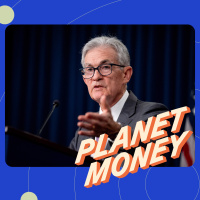Sinopsis
The economy, explained, with stories and surprises. Imagine you could call up a friend and say, "Meet me at the bar and tell me what's going on with the economy." Now imagine that's actually a fun evening. That's what we're going for at Planet Money. People seem to like it.
Episodios
-
The veteran loan calamity
01/11/2024 Duración: 36minRay and Becky Queen live in rural Oklahoma with their kids (and chickens). The Queens were able to buy that home with a VA loan because of Ray's service in the Army. During COVID, the Queens – like millions of other Americans – needed help from emergency forbearance. They were told they could pause home payments for up to a year and then pick up again making affordable mortgage payments with no problems.That's what happened for most American homeowners who took forbearance. But not for tens of thousands of military veterans like Ray Queen.On today's show, we follow two reporters' journey to figure out what went wrong with the VA's loan forbearance program. How did something meant to help vets keep their houses during COVID end up stranding tens of thousands of them on the brink of foreclosure? And, once the error was spotted, did the government do enough to make things right?Today's episode was produced by James Sneed. It was edited by Meg Cramer. And fact-checked by Dania Suleman. Engineering by Cena Loffred
-
So your data was stolen in a data breach
31/10/2024 Duración: 28minIf you... exist in the world, it's likely that you have gotten a letter or email at some point informing you that your data was stolen. This happened recently to potentially hundreds of millions of people in a hack that targeted companies like Ticketmaster, AT&T, Advance Auto Parts and others that use the data cloud company Snowflake.On today's show, we try to figure out where that stolen data ended up, how worried we should be about it, and what we're supposed to do when bad actors take our personal and private information. And: How our information is being bought, sold, and stolen.This episode was hosted by Amanda Aronczyk and Keith Romer. It was produced by Sam Yellowhorse Kesler and edited by Meg Cramer. It was engineered by Ko Takasugi-Czernowin with an assist from Kwesi Lee, and fact-checked by Dania Suleman. Alex Goldmark is Planet Money's executive producer.Help support Planet Money and hear our bonus episodes by subscribing to Planet Money+ in Apple Podcasts or at plus.npr.org/planetmoney.Learn m
-
Why do hospitals keep running out of generic drugs?
25/10/2024 Duración: 26minThere's something strange going on in hospitals. Cheap, common drugs that nurses use every day seem to be constantly hit by shortages. These are often generic drugs that don't seem super complicated to make, things like dextrose and saline (aka sugar water and salt water).So what's going on? The answer, as with anything in healthcare, is complicated.On today's show: why hospitals keep running out of generic drugs. The story behind these shortages tells us a lot about how these drugs are made, bought and sold–and, it shows us how these markets can falter without the proper care.This episode was hosted by Sally Helm and Alexi Horowitz-Ghazi. It was produced by Willa Rubin, with help from James Sneed and Sam Yellowhorse Kesler. It was edited by Martina Castro. Fact-checking by Dania Suleman. Planet Money's executive producer is Alex Goldmark.Help support Planet Money and hear our bonus episodes by subscribing to Planet Money+ in Apple Podcasts or at plus.npr.org/planetmoney.Learn more about sponsor message choic
-
Romance on the screen and on the page: Two Indicators
23/10/2024 Duración: 17minOn today's show, we have two stories from The Indicator, Planet Money's daily podcast. They just launched Love Week, a weeklong series exploring the business and economic side of romance.First, hosts Wailin Wong and Adrian Ma fire up the gas logs and pour a mug of cocoa to discuss the made-for-TV rom-com machine, and how television executives learned to mass produce seasonal romance.Then, Wailin and host Darian Woods discuss another romance medium: the romance novel. Once relegated to supermarket aisles, these books are now mainstream. And authors, an often-maligned group within publishing, have found greater commercial success than many writers in other genres. We find out how romance novelists rode the e-book wave and networked with each other to achieve their happily-for-now status in the industry.This episode is hosted by Erika Beras, Wailin Wong, Adrian Ma, and Darian Woods. These episodes of The Indicator were originally produced by Julia Ritchey and engineered by Kwesi Lee. They were fact-checked by Si
-
The Subscription Trap
18/10/2024 Duración: 30minOver the past two decades, there's been a sort of tectonic economic shift happening under our feet. More and more companies have switched from selling goods one by one to selling services, available as a subscription. These days everything from razor blades to meal kits to car washes have become subscriptions. But all that convenience has also come with a dark side – some companies have designed their offerings to be as easy as possible to sign up for and also as difficult as possible to cancel. Many consumers are now paying for way more subscriptions than they even know about.On today's show, we discover how we all fell into this subscription trap – who is winning and who is losing in this brave new subscription based world – and what both the government and the free market are doing to try and fix it.This episode was hosted by Alexi Horowitz-Ghazi and Jeff Guo. It was produced by James Sneed. It was edited by Jess Jiang, fact-checked by Sierra Juarez, and engineered by Valentina Rodriguez Sanchez. Alex Gold
-
We asked 188 economists. And the survey says...
16/10/2024 Duración: 21minFor our story on this year's Nobel in Economics, check out our daily show, The Indicator!Let's face it. Economics is filled with terms that don't always make sense to the average person. Terms that sometimes mean what you think they mean, but sometimes not at all. Not even close.We surveyed 188 economists. And we asked them: What are the most misunderstood terms in the field of economics?On today's show, their answers! Hear stories about near recessions, a problem with insurance, econ at your local movie theater, and... an economics term that will make undergrads blush. Strap in, and bring your popcorn!This episode was hosted by Amanda Aronczyk and Alexi Horowitz-Ghazi. It was produced by Sam Yellowhorse Kesler with help from Sean Saldana. It was edited by Jess Jiang, engineered by Valentina Rodríguez Sánchez and fact-checked by Sierra Juarez. Alex Goldmark is our executive producer.Help support Planet Money and hear our bonus episodes by subscribing to Planet Money+ in Apple Podcasts or at plus.npr.org/plane
-
So imPORTant: Bananas, frogs, and... Bob's??
11/10/2024 Duración: 25minEven in our modern world with planes and jets and drones, the vast majority of goods are moved around the planet in cargo ships. Which means our ports are the backbone of our global economy. The longshoremans' strike closed the eastern ports for only three days, but those three days raised a lot of questions.Like - why is a discount furniture store the fourth largest importer on the East Coast? How come so many bananas come through Wilmington, Delaware? Why do we need live frogs delivered into the US six times a month? And... how do we even keep track of all of these imports? On today's episode, we get into #PortFacts!This episode was hosted by Kenny Malone and Amanda Aronczyk. It was produced by Sam Yellowhorse Kesler. It was edited by Audrey Quinn, and fact-checked by Dania Suleman. Engineering by Cena Loffredo and Kwesi Lee with an assist from Valentina Rodriguez Sanchez. Alex Goldmark is Planet Money's executive producer.Help support Planet Money and hear our bonus episodes by subscribing to Planet Money+
-
Can cap and trade work in the US?
09/10/2024 Duración: 24minRecently, the state of Washington embarked on an ambitious new plan to combat climate change. Taking a page from economics textbooks, the state instituted a statewide "cap and trade" system for carbon emissions. The state establishes a cap on the total amount of carbon pollution it is willing to allow each year, and then gives away or auctions off carbon emission permits that add up to that total. Companies can then trade those permits on the open market.Economists love cap and trade plans because they establish a limit on carbon emissions while letting the market find the most efficient way for decarbonization to occur. But cap and trade has had a hard time catching on, especially in the U.S.The stakes are high for Washington's new plan. If it succeeds, it could convince other states to implement their own versions, but if it fails, it might serve as a cautionary tale. On today's show, we take a look at how Washington's grand experiment with cap and trade is faring.This episode was hosted by Keith Romer and
-
What's up with all the ads for law firms?
04/10/2024 Duración: 18minThe lawyer commercial is almost an art form unto itself. Learned practitioners of the law doing whatever it takes to get your attention, from impressive dirt bike stunts to running around half naked. All so when you land in trouble, you don't have to think hard to remember their name. Odds are you can name one or two right now.This world of law ads did not exist fifty years ago. Then, lawyers were not allowed to advertise. Not by law, by the exclusive organization that decides who gets to be a lawyer: state bars.On today's episode, how that changed. How a couple of lawyers placing an ad in a local newspaper led to the inescapable world of law firm ads we know today. And, how the right to advertise got put on the same level as some of the most important, fundamental rights we have.This episode was hosted by Nick Fountain and Jeff Guo. It was produced by Sam Yellowhorse Kesler with help from Sean Saldana. It was edited by Jess Jiang. It was fact-checked by Sierra Juarez and engineered by Valentina Rodríguez Sán
-
How Venezuela imploded (update)
02/10/2024 Duración: 23min(Note: A version of this episode originally ran in 2016.)Back in 2016, things were pretty bad in Venezuela. Grocery stores didn't have enough food. Hospitals didn't have basic supplies, like gauze. Child mortality was spiking. Businesses were shuttering. It's one of the epic economic collapses of our time. And it was totally avoidable.Venezuela used to be a relatively rich country. It has just about all the economic advantages a country could ask for: Beautiful beaches and mountains ready for tourism, fertile land good for farming, an educated population, and oil, lots and lots of oil.But during the boom years, the Venezuelan government made some choices that add up to an economic time bomb.Today on the show, we have an economic horror story about a country that made all the wrong decisions with its oil money. It's a window into the fundamental way that money works and how when you try to control it, you can lose everything.Then, an update on Venezuela today. How it went from a downward spiral, to a tentative
-
What's THAT got to do with economics?
27/09/2024 Duración: 25min"Wanna see a trick? Give us any topic and we can tie it back to the economy."That is the bold promise in Planet Money's tagline. And we believe the show does live up to it. Over the last year, we've told stories about breakdancing, rum, pagers, buffets, colors, and heartbreak.But then one host wondered: what if we really held ourselves to that promise? What if we challenged ourselves to find economic meaning in the most esoteric and far-flung topics imaginable?That's when we turned to you, our listeners. And boy did you deliver. You sent in ideas so obscure, so banananas, so guaranteed to stump and bamboozle that our host maybe started to regret her life choices...but she was resolved to give it a try. This episode was hosted by Sally Helm and Keith Romer. It was produced by James Sneed. It was edited by Molly Messick and fact-checked by Sierra Juarez. Engineering by Kwesi Lee. Alex Goldmark is Planet Money's executive producer.Help support Planet Money and hear our bonus episodes by subscribing to Planet Mon
-
Veep-onomics
25/09/2024 Duración: 25minNext week, JD Vance and Tim Walz will face off in the only confirmed vice presidential debate ahead of the election. As voters look ahead to what their economic policies might be, we look back to see what they have said and done, and how it turned out.Planet Money's newsletter author Greg Rosalsky has spent some time combing through the economic records of Vance and Walz, and has some knowledge to share. Why does Walz support universal free school lunches, and why do some criticize him for it? Why have some called Vance a "Khan-servative?" And, how much do these candidates represent a break from the past?This episode was hosted by Nick Fountain and Greg Rosalsky. It was produced by James Sneed and Emma Peaslee. It was edited by Meg Cramer. Sierra Juarez fact-checked it, and it was engineered by Valentina Rodríguez Sánchez. Alex Goldmark is Planet Money's Executive Producer. Help support Planet Money and hear our bonus episodes by subscribing to Planet Money+ in Apple Podcasts or at plus.npr.org/planetmoney.Le
-
How to save 10,000 fingers
20/09/2024 Duración: 24minTable saws are extremely dangerous. The government estimates that injuries from table saws send something like 30,000 people to the emergency room every year. 3,000 of those end in amputations. The costs of those injuries are enormous. Are they also avoidable?In 1999, inventor Steve Gass had a realization: Humans conduct electricity pretty well; Wood does not. Could he develop a saw that could tell the difference between the two?Steve invented a saw that can detect a finger and stop the blade in milliseconds. Then, he tried to license it to the big tool companies. He thought it was a slam dunk proposition: It would dramatically reduce the injuries, and the cost of medical treatments and lost wages associated with them.On today's episode: What does it take to make table saws safer? When someone gets hurt by a power tool, there are tons of costs, tons of externalities. We all bear the cost of the injury, in some way. So, it can be in society's best interest to minimize those costs. We follow Steve's quest to sa
-
Can money buy happiness?
18/09/2024 Duración: 28minPeople often say that money can't buy you happiness. Sometimes, if you ask them to tell you more about it, they'll mention a famous 2010 study by Nobel Prize winners Daniel Kahneman and Angus Deaton. That study found that higher household income correlates with greater emotional well-being, but only up to around $75,000 a year. After that, more money didn't seem to matter.This was a famous study by two famous academics. The result stood for over a decade. And it feels good, right? Maybe the rich aren't so much happier than anyone else. But researchers have recently done a complete 180 on this idea. In 2021, psychologist Matt Killingsworth found nearly the opposite: That more money does correlate with more happiness. And that the relationship continues well beyond $75,000 per year.Today on the show: Does more money mean fewer problems? Two researchers with totally different takes come together to hammer out a better understanding of the relationship between money and happiness.This episode was hosted by Sally
-
99 Percent Invisible: The White Castle System of Eating Houses
16/09/2024 Duración: 32minToday we have a guest episode from 99 Percent Invisible.It is about White Castle, the burger chain. Even if you haven't visited, you have tasted its influence because, as we will learn in this episode, White Castle is really the proto-burger chain.Our friends at the excellent podcast 99 Percent Invisible bring us the origin story of White Castle and trace its influence on the business of fast food, and on American eating habits. The story is about one man who had an idea for a world where you could get a slider anywhere in the country and get the same tasty, onion-y quality each time. Think of this as a forebear of the modern global economy of sameness.This episode is hosted by Roman Mars and reported by Mackenzie Martin. It was produced by Jeyca Maldonado-Medina, and edited by Joe Rosenberg. Mix and sound design by Martín Gonzalez. Music by Swan Real with additional music by Jenny Conlee, Nate Query, and John Neufeld. Fact-checking by Graham Hacia. Kathy Tu is 99 Percent Invisible's executive producer. Kurt
-
Rate Expectations
13/09/2024 Duración: 23minThe Federal Reserve raised interest rates to get inflation under control. One side effect is that taking out a mortgage to buy a home has gotten very expensive. That's especially a problem for some homeowners who managed to get a lower mortgage rate years ago. They have a sort of... champagne problem. Or, "golden handcuffs" as it's called.These homeowners may find they are "locked in" to their current home. In order to move to a new home, they have to take out a new mortgage at a much higher rate. It is one of the many problems plaguing the housing market right now.The Fed is expected to start cutting rates next week. Will the golden handcuff mess finally start to unlock? And what does it mean for people looking to buy their first home?On today's episode: We go deep into the golden handcuff problem and why it matters for everyone (including non-homeowners). We have FOMO about a big economic symposium in Jackson Hole, Wyoming. And we contemplate how to pronounce one of the most important interest rates in the
-
Is AI overrated or underrated?
11/09/2024 Duración: 18minAre the promises made by AI boosters all hype, or are we actually under-appreciating the transformative potential of AI?Can artificial intelligence make humans more productive, unlock hidden potential and remake work as we know it? Or, should it not even be called intelligence at all, artificial or otherwise.On today's episode, we take sides. Two reporters flip a coin to see who argues which point: is AI overrated or underrated? They bring research, real world examples, expert opinions and warm blooded human insight. You decide who makes the best case.If you're interested in learning more, check out Greg's article 10 reasons why AI is overrated. It includes all sorts of reporting we couldn't fit into the episode. And while you're there, subscribe to the Planet Money newsletter.Today's episode was hosted by Darian Woods and Greg Rosalsky. These episodes of the Indicator were originally produced by Corey Bridges and they were edited by Paddy Hirsch. They were engineered by Valentina Rodríguez Sánchez and Neal R
-
Summer camp capitalism
06/09/2024 Duración: 33minSummer camp is a classic rite of passage in the U.S. It's a place of self-discovery, where kids come to make new friends and take on new challenges. But what if it were ALSO a place where children came to learn how to survive in a free market economy?That's part of the idea behind a summer camp at JA BizTown, in Portland, Oregon. Kids at the camp run tiny fake businesses in a tiny fake town. There are retail stores and restaurants, insurance companies and power utilities. As camp begins, a gaggle of child CEOs take out business loans from their peers in the tiny fake banking industry – and they spend the day racing to run their businesses profitably enough to get out of debt before pickup time. On today's show, Planet Money takes a romp through capitalism summer camp. Will the children of BizTown be able to make ends meet and pay back their loans to the banks? Or will a string of defaults send this dollhouse economy into financial collapse? It's Shark Tank meets Lord of the Flies.This episode was hosted by Al
-
Bingo! (Presidential debate edition)
04/09/2024 Duración: 29minCampaigns can be a jargony slog. And this year, we are seeing a lot of economic terms being thrown around, many of which... aren't entirely straightforward.In this episode, we try to make the mess of words that accompany a presidential campaign into something a little less exhausting: A game of bingo.Follow along as we dig into five terms that we expect to hear in the upcoming presidential debate, along with some others we hope to hear.You can play along, too, at npr.org/bingo. Play online or print cards to play with friends on debate night!This episode was hosted by Nick Fountain and Erika Beras. It was produced by Sam Yellowhorse Kesler with help from Emma Peaslee. It was edited by Meg Cramer. It was fact-checked by Sierra Juarez and engineered by Cena Loffredo. Alex Goldmark is our executive producer.Help support Planet Money and hear our bonus episodes by subscribing to Planet Money+ in Apple Podcasts or at plus.npr.org/planetmoney.Learn more about sponsor message choices: podcastchoices.com/adchoicesNPR
-
How to fix a housing shortage
30/08/2024 Duración: 23minWhen Cody Fischer decided to get into real estate development, he had a vision. He wanted to build affordable, energy efficient apartments in Minneapolis, not far from where he grew up.His vision was well-timed because, in 2019, Minneapolis's city council passed one of the most ambitious housing plans in the nation. One aim of that plan was to alleviate the city's housing shortage by encouraging developers like Cody to build, build, build.But when Cody tried to build, he ran into problems. The kinds of problems that arise all over the country when cities confront a short supply of housing, and try to build their way out.Today on the show, NIMBYism, YIMBYism and why it's so hard to fix the housing shortage. Told through the story of two apartment buildings in Minneapolis.This episode was hosted by Amanda Aronczyk and Kenny Malone. It was produced by Emma Peaslee and Sofia Shchukina, and edited by Molly Messick. It was engineered by James Willets and fact-checked by Sierra Juarez. Alex Goldmark is Planet Money'






























